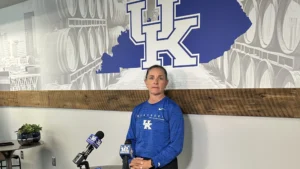
Boo Carter’s Decision to Stay at Tennessee: A Game-Changer in College Football’s NIL Era
In a landscape where college athletes are increasingly influenced by lucrative NIL (Name, Image, and Likeness) deals, Boo Carter’s decision to remain with the Tennessee Volunteers, despite a reported $7.7 million offer from the Texas Longhorns, stands out as a significant moment in college football. This move not only highlights Carter’s personal values and commitment to his roots but also underscores the evolving dynamics of college athletics in the NIL era.
The Rise of Boo Carter
Boo Carter’s journey to prominence began in Chattanooga, Tennessee, where he attended Bradley Central High School. His exceptional skills on the field earned him the prestigious title of Mr. Tennessee Football in 2024, a testament to his dominance in high school football. Standing at 6 feet and weighing 180 pounds, Carter was a versatile athlete capable of excelling in multiple positions.
As a four-star recruit, Carter’s decision to commit to Tennessee was influenced by his desire to stay close to home and contribute to his home state’s program. His commitment was not just about proximity but also about the opportunity to make a significant impact at a Power Five program.
Freshman Year Impact
Carter’s freshman year at Tennessee was nothing short of impressive. He appeared in all 13 games, showcasing his versatility by contributing both as a defensive back and a return specialist. On defense, he recorded 38 tackles, including three tackles for loss, one sack, and an interception. His performance earned him a spot on the SEC All-Freshman team.
In addition to his defensive prowess, Carter made significant contributions on special teams. Taking over punt return duties midway through the season, he averaged 16.5 yards per return, providing Tennessee with excellent field position and demonstrating his playmaking ability.
The Transfer Portal Speculation
Despite his successful freshman campaign, rumors began circulating in late 2024 about Carter’s potential interest in entering the transfer portal. Speculation suggested that Carter was seeking a more prominent role in Tennessee’s offense, similar to the two-way impact players emerging in college football. These rumors gained traction, especially after reports indicated that Carter was in discussions with Tennessee’s coaching staff about his future role.
The situation intensified when reports surfaced of Texas extending a substantial NIL offer to Carter, reportedly amounting to $7.7 million. Such an offer would have made Carter one of the highest-paid college athletes, further fueling speculation about his potential move.
The Decision to Stay
In response to the mounting speculation, Carter took to social media to announce his decision to remain at Tennessee. Posting a graphic with the phrase “Back home 🏚️! @BuckFitz,” Carter reaffirmed his commitment to the Volunteers. The inclusion of “The Volunteer Club” branding in his post indicated that he had signed a new NIL deal, aligning with Tennessee’s efforts to retain him.
This decision was a significant one, considering the financial incentives offered by Texas. However, Carter’s choice to stay at Tennessee reflects his personal values and commitment to his home state. It also underscores the importance of factors beyond financial compensation in an athlete’s decision-making process.
The Role of NIL in College Athletics
Carter’s situation highlights the growing influence of NIL deals in college athletics. While these deals provide athletes with opportunities to profit from their name, image, and likeness, they also introduce complexities into the recruitment and retention processes. Programs are increasingly leveraging NIL deals to attract and retain top talent, leading to a more competitive and financially driven college sports landscape.
However, Carter’s decision suggests that NIL deals, while significant, are not the sole determining factor for all athletes. Personal connections, loyalty to one’s home state, and the desire to contribute to a program’s success continue to play crucial roles in an athlete’s decision-making process.
Implications for Tennessee and College Football
For Tennessee, retaining Carter is a significant victory. His decision to stay bolsters the Volunteers’ defense and special teams, providing them with a dynamic playmaker. Moreover, Carter’s commitment sends a positive message about the program’s culture and its ability to retain top talent amidst the evolving NIL landscape.
Carter’s decision also sets a precedent in college football, demonstrating that athletes can prioritize factors beyond financial incentives. It challenges the notion that NIL deals are the primary motivator for college athletes, encouraging a broader perspective on what influences an athlete’s decision to stay or transfer.
Looking Ahead
As Carter prepares for his sophomore season, expectations are high. His dual-threat capabilities as a defensive back and return specialist make him a valuable asset to Tennessee’s football program. Additionally, discussions about expanding his role in the offense could further enhance his impact on the field.
Carter’s journey is a testament to the evolving nature of college athletics, where NIL deals intersect with personal values and commitments. His decision to stay at Tennessee serves as a reminder that, in the end, the love for the game and loyalty to one’s roots can outweigh financial considerations.
In conclusion, Boo Carter’s choice to remain at Tennessee, despite a substantial NIL offer from Texas, marks a pivotal moment in college football. It highlights the multifaceted nature of athletes’ decision-making processes and underscores the importance of factors beyond financial incentives in shaping the future of college athletics.





